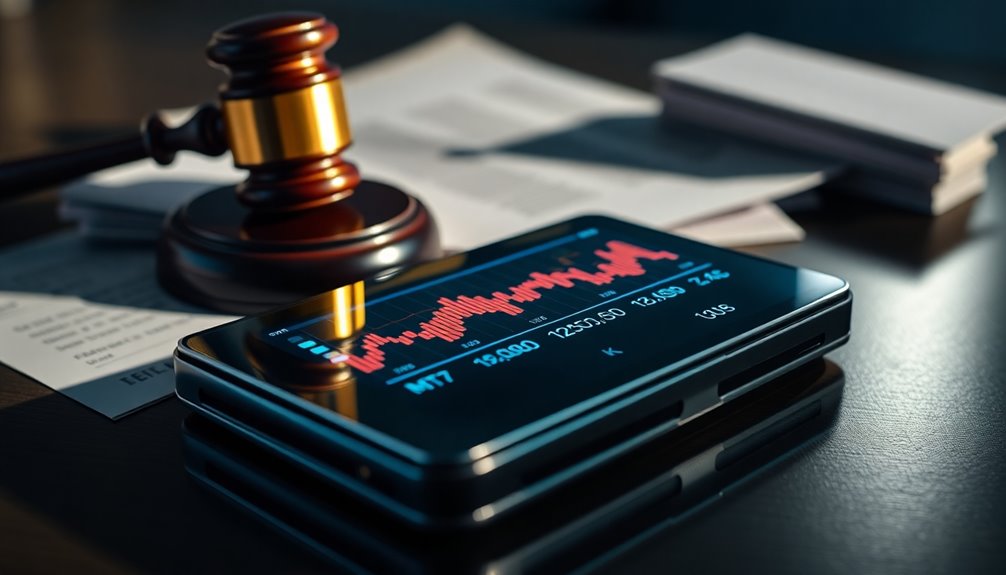Your crypto deals aren't as secure as you might think, especially with transaction hash vulnerabilities lurking in the background. While blockchain technology offers decentralization and immutability, attacks like transaction malleability and phishing can put your assets at risk. Relying solely on digital signatures and private key protection isn't enough; you need robust security measures like multi-signature wallets and two-factor authentication to safeguard your investments. Regular audits and network monitoring are crucial to stay one step ahead of threats. Understanding the full range of vulnerabilities will help you fortify your security as you navigate the crypto landscape.
Key Takeaways
- Transaction hashes are generally secure due to blockchain's immutability, but vulnerabilities can arise from weak private key management or compromised wallets.
- Phishing attacks and transaction malleability can exploit transaction hashes, leading to unauthorized access and financial loss.
- Regular security audits and monitoring are essential to identify and mitigate risks associated with transaction hash vulnerabilities.
- Utilizing multi-signature wallets and strong passwords enhances transaction security by adding additional layers of protection.
- Staying informed about emerging threats, such as ransomware and smart contract vulnerabilities, is crucial for maintaining crypto deal security.
Crypto Transaction Security Overview

While you navigate the world of cryptocurrencies, understanding transaction security is crucial.
Blockchain technology serves as a decentralized ledger, recording all transactions in an immutable format. This means once a transaction is added, it can't be altered, providing transparency that helps detect malicious activity. Additionally, cryptocurrencies enable digital transactions without physical currency exchange, which enhances the overall security of transactions. Free crypto opportunities allow users to engage with the ecosystem without significant initial investment, adding an extra layer of accessibility.
Consensus mechanisms like Proof of Work and Proof of Stake validate transactions, preventing fraud and double-spending. Additionally, cryptographic techniques enhance security; digital signatures authenticate transactions, while hashing ensures data integrity.
Protecting private keys and implementing multi-signature wallets further safeguard your assets. By employing strong passwords and two-factor authentication, you can mitigate risks.
Regular security audits and network monitoring also keep your transactions secure, ensuring your crypto dealings remain protected.
Recent Crypto Regulation Changes

As the cryptocurrency landscape evolves, recent regulatory changes are reshaping how businesses and investors navigate the market.
In the U. S. , the potential transfer of crypto oversight from the SEC to the CFTC aims to clarify definitions of securities versus commodities. This shift could reduce litigation, allowing companies to focus on growth. This change in regulatory oversight comes in the wake of increased scrutiny of the cryptocurrency industry, particularly following the recent court ruling on SEC and Coinbase. By establishing clearer guidelines, the transition may also enhance investor confidence, as it fosters a more predictable regulatory environment. With the CFTC’s experience in commodity markets, many believe this approach could pave the way for innovative financial products and services in the blockchain space.
Meanwhile, the IRS is tightening tax compliance with new cost basis reporting requirements, putting more administrative burdens on taxpayers. The anticipated shift in regulatory oversight could lead to increased scrutiny on crypto compliance and reporting standards.
In the EU, the MiCA regulation introduces licensing requirements, enhancing consumer confidence and promoting international consistency.
While these regulations may initially strain business resources, they promise long-term benefits, such as improved market stability and reduced risks, ultimately fostering a more secure crypto environment.
Crypto Price Volatility Analysis

Crypto price volatility can often feel like a wild ride, influenced by a myriad of factors that can change in an instant. Market sentiment plays a huge role; news and social media can spark rapid price fluctuations, especially when fear, uncertainty, and doubt (FUD) take hold. When positive news hits, you might see prices soar as investors rush in. Additionally, increased institutional investor participation has been noted during recent years, further amplifying market movements. Limited supply compounds this volatility, particularly with assets like Bitcoin, where increased demand can quickly push prices up. Furthermore, crypto whales can significantly influence prices through their trading activities, often leading to erratic market behavior. Additionally, movements by 'crypto whales' can shake the market significantly, while smaller assets struggle with liquidity. Understanding these dynamics helps you navigate the unpredictable waters of cryptocurrency trading and make informed decisions.
Corporate Blockchain Integration

Corporate blockchain integration is transforming the way businesses operate by enhancing security, transparency, and efficiency.
With digital signatures and immutable records, you can ensure that access is verified, while decentralized storage makes your data nearly impossible to hack. Real-time monitoring also identifies unauthorized access attempts, boosting data integrity and customer loyalty. Additionally, higher data security provided by blockchain technology significantly reduces the risk of data breaches.
The transparency provided by blockchain facilitates clear reporting and supply chain visibility, reducing disputes and speeding up reconciliations.
By automating manual tasks through smart contracts, you lower operating costs by eliminating intermediaries. This results in instantaneous processes, enhancing customer experience and improving business agility.
Election Year Market Reactions

During election years, market reactions can be swift and dramatic, especially in the cryptocurrency sector. When Trump won, Bitcoin skyrocketed past $75,000, with altcoins like Ethereum and Dogecoin following suit.
You probably noticed crypto stocks, like those of Robinhood and MicroStrategy, also surged. Prediction markets, where you could bet on election outcomes using crypto, saw over $2 billion wagered, reflecting the market's volatility and uncertainty regarding future regulations. Trump's pro-crypto stance fueled optimism for a more crypto-friendly environment, and his endorsements sent strong signals of government support for Bitcoin. Additionally, analysts predict the potential for Bitcoin to exceed $100,000 in the near future.
However, while the excitement is palpable, be mindful that historical volatility and regulatory concerns could impact the long-term sustainability of these gains.
Emerging Threats in Blockchain Security

As the cryptocurrency market experiences heightened activity, emerging threats in blockchain security are becoming increasingly significant. You should be aware of phishing attacks that use homograph domains and spoofed websites to steal your credentials. Additionally, hacked trading platforms pose serious risks, as seen in the Coincheck hack, where over $500 million was stolen. Transaction malleability attacks can manipulate transaction IDs, leading to double deposits or withdrawals, which can cost you dearly. Lastly, ransomware and vulnerabilities in smart contracts are rising concerns, especially in DeFi projects. Staying informed and vigilant about these threats is crucial to protecting your assets and ensuring your transactions remain secure in this evolving landscape. To enhance your defenses, consider implementing unique security controls specific to blockchain technology.
Frequently Asked Questions
What Is a Transaction Hash in Cryptocurrency?
A transaction hash in cryptocurrency is a unique string created when you initiate a transaction. It helps you track progress and verify completion on the blockchain.
Each hash is generated from components like sender and receiver addresses, transaction amount, and timestamp, ensuring that even a tiny change in data results in a different hash.
This process maintains data integrity, security, and prevents tampering, making your transactions secure and trustworthy.
How Can I Verify a Transaction Hash?
Verifying a transaction hash is as easy as pie! Start by using blockchain explorers like Etherscan, Solscan, or Mempool.space.
Just enter the transaction hash, and you'll see all the details—sender and receiver addresses, transaction amount, and timestamp.
Don't forget to check the network fees and confirmations to ensure everything's legit. This way, you can feel confident that your crypto transactions are secure and accurate, keeping your investments safe.
What Happens if a Transaction Hash Is Compromised?
If a transaction hash is compromised, you risk significant issues.
Attackers might exploit collision attacks, substituting malicious data for legitimate information without detection. This can lead to unauthorized modifications, data breaches, and financial losses.
Trust in the system erodes, and your assets could be jeopardized.
To safeguard yourself, use strong cryptographic hash functions and conduct regular security audits to ensure the integrity of your transactions and protect your investments.
Are All Transaction Hashes Unique?
Yes, all transaction hashes are unique. Each hash acts like a digital fingerprint for a transaction, ensuring no two transactions share the same hash.
When you initiate a transaction, the hashing process generates a unique identifier based on the transaction's data.
This uniqueness is crucial for maintaining the integrity and security of the blockchain, allowing you to track your transactions confidently without worrying about duplicates or tampering.
Can Transaction Hash Vulnerabilities Affect Smart Contracts?
Like a house of cards, smart contracts can easily collapse under the weight of transaction hash vulnerabilities.
Yes, these vulnerabilities can seriously affect smart contracts. If attackers manipulate transaction hashes, they can exploit weaknesses like reentrancy or front-running attacks.
This manipulation threatens the integrity of your transactions and the security of your investments.
Conclusion
In a world where your crypto deals can feel like a high-stakes poker game, it's crucial to know the cards you're holding. Just like a savvy player who studies their opponents, staying informed about transaction hash vulnerabilities can protect you from costly bluffs. With crypto regulations shifting and threats emerging, don't leave your investments to chance. Equip yourself with knowledge and strategies to navigate this volatile landscape, ensuring your digital assets remain secure and thriving.









